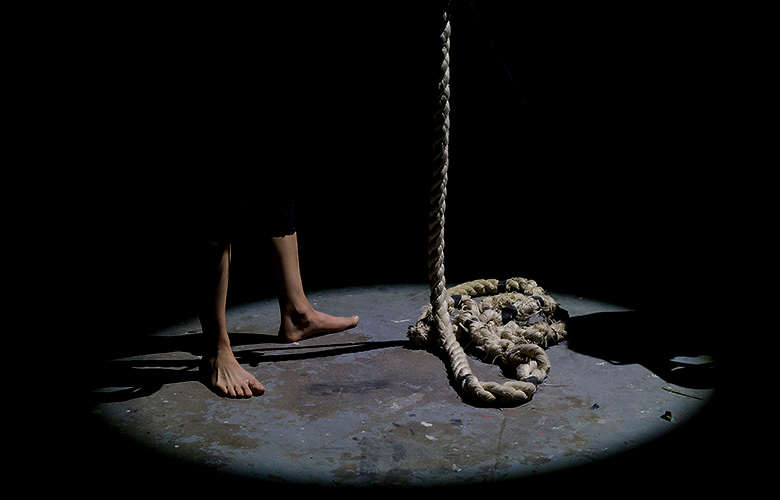
When I was first learning how to “be” a stage manager, I learned how to properly record blocking, how to lay out spike tape, and the best way to distribute a schedule. Nothing prepared me for having a direct impact on the physical well-being of my performers.
Even with that hindsight knowledge, I would still be just as nervous calling a fast-paced lighting sequence as I would a slow-paced automated aerial sequence. Stage managers are perfectionists, that’s why we do what we do. But like every other field of work, our path is nothing but grey areas.
When I was a very young Production Stage Manager on a one-nighter-tour, one of my performers was injured on stage towards the end of Act 2. I may have an overly-cinematic memory of the incident, but I remember seeing all the performers simultaneously turning to look at me, at my calling booth in the downstage right wing. I didn’t know what to do. Nothing I had been taught or experienced up to that point could inform me as to what the proper course of action should be. Looking back with my 20/20 hindsight vision, I would have done everything differently. But I didn’t know in that moment of my life any better course of action.
In my current position, I call one of the most heavily automated stage shows in the world, and teach other stage managers to call the show.
I have 2 main points that I stress throughout the time I train a new show-caller: 1) You will make the best decision you can make with the information you have in that moment. 2) You are NOT the only person looking at the stage, so use the information and wisdom from your technicians to guide your decisions.
With a long-running show, there are contingencies that occur more frequently than you’d like, so you know exactly what to do and what actions need to be taken. But there are always the weird nights – full moons, Mercury in retrograde (which isn’t actually a thing, according to my science friends). The stage completely revolts against everything it is programmed to do, and somehow you’re the one who has to steer the haphazard ship. You’ll make decisions that you’ll second-guess afterwards, and wonder why you didn’t go with option #23 instead of option #22.
I just watched the movie Sully, which chronicles the U.S. Airways airplane landing on the Hudson River in NYC (Captain Sully adamantly calls it an unexpected water landing, NOT a crash). I would not deign to compare a stage manager’s job to an airplane pilot’s job, but I felt so much empathy for Captain Sullenberger and his First Officer, Jeffrey Skiles. As they sat in their hearing to discuss whether or not they made the right decision, I was reminded of every time I have called a cue that had the chance of putting a performer or technician in a dangerous situation. After tough show calls, we are able to use video recordings to analyze what happened, and how decisions were made.
Thankfully, these almost never involve an injury, but due diligence needs to be taken to decrease the likelihood of anyone being put in harm’s way. One of the most frequently asked questions following an incident is, “Why wasn’t action taken any faster? It took forever for anything to happen!”
But time has a way of standing still when adrenaline takes over.
Upon reviewing the video and using a stopwatch, it’s usually made clear that action is taken very quickly, it’s just not always readily apparent to anyone not wearing a headset.
When a situation arises, especially when it’s a situation that has never been imagined as a possibility, time is needed to assess the situation and decide on a course of action. So when the movie “Sully” addressed this human reaction time component, I literally pointed at the television and shouted “THANK YOU!” And I didn’t even spill my wine.
Speaking only for myself, here is what usually happens when an unexpected and new incident occurs when I’m calling my show:
Maybe someday we can have something akin to flight simulators for show callers to use. Wouldn’t it be awesome if you could practice calling a difficult sequence, without the risk of putting anyone or anything in danger? Surely in this age of augmented reality and virtual reality, we’re not too far from something like that. For the time being, we’ll have to make do with our pesky instincts and human reaction time.
Fake It Till You Make It Some More
Ending Up In Vegas: A Stage Managers Story


Mary Barnett hates talking about herself in the 3rd person, almost as much as she hates writing her own bio. Before she was able to complain about such trivial things, Mary graduated with a B.A. in Theatre/Speech from Wagner College – located on Staten Island, merely a few miles from one of the largest landfills in the world. While living in New York after college, Mary stage managed shows with Prospect Theatre Company, New York Classical Theatre, Shawnee Playhouse, and College Light Opera Company. She then hit the road with the national tours of “Rent” and “Seussical the Musical,” and eventually landed in Las Vegas with “Avenue Q” at The Wynn Hotel, followed by a brief stint with Penn & Teller. Mary has worked for Cirque du Soleil since 2006, mostly at “The Beatles LOVE” where she is currently General Stage Manager. She also spent a blissful 10 weeks with Cirque du Soleil’s “KA,” and was Production Stage Manager for the 2015 benefit performance for the foundation "One Night for One Drop". Mary’s husband is an Automation technician for Cirque du Soleil’s “Michael Jackson ONE,” and they are attempting to raise their 2 kids with minimal exposure to strippers and gambling.
Read Full Profile© 2021 TheatreArtLife. All rights reserved.

Thank you so much for reading, but you have now reached your free article limit for this month.
Our contributors are currently writing more articles for you to enjoy.
To keep reading, all you have to do is become a subscriber and then you can read unlimited articles anytime.
Your investment will help us continue to ignite connections across the globe in live entertainment and build this community for industry professionals.